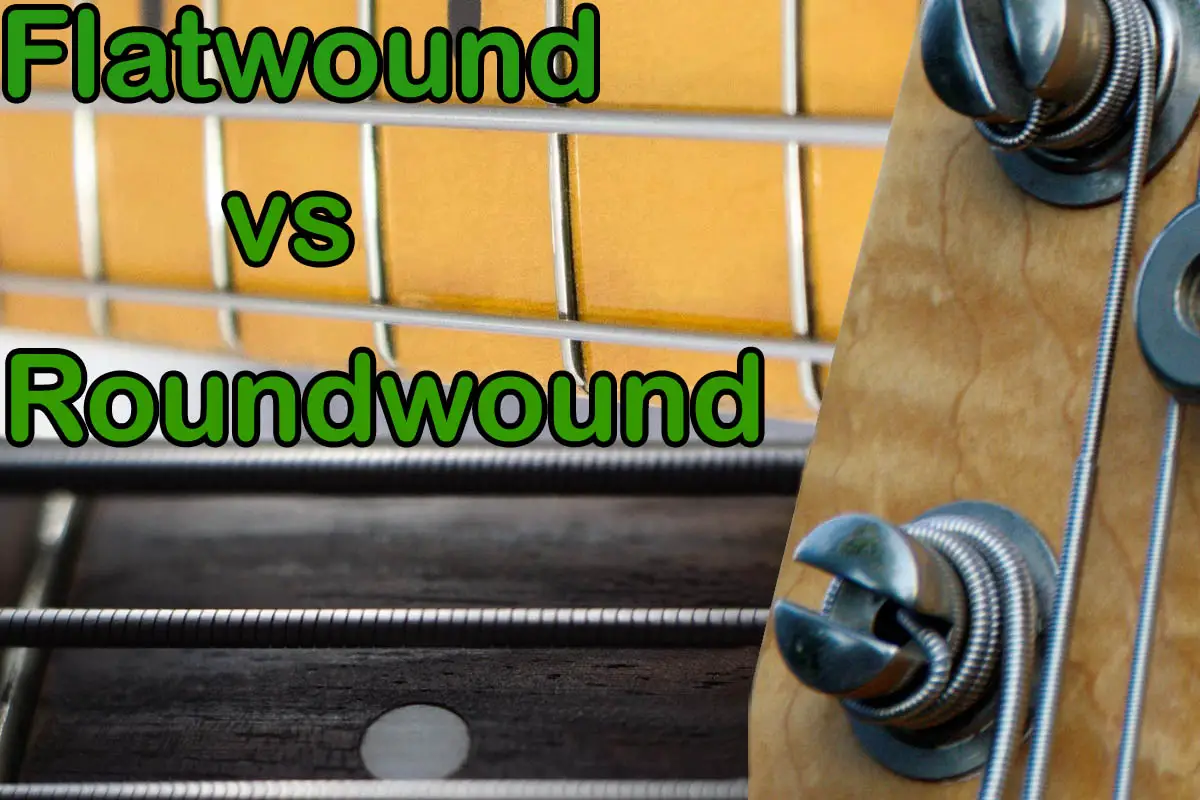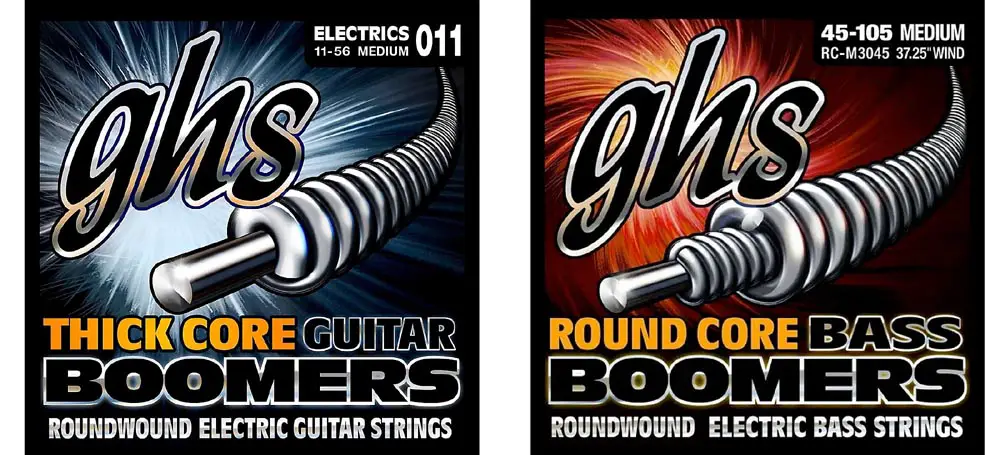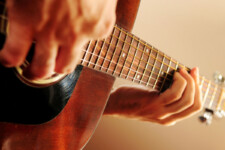Flatwound vs Roundwound Strings (Guitar & Bass Tips)
Choosing between flatwound strings and roundwound strings can be a difficult decision to make, and gaining some knowledge first can help you work out if you should make the change.
Flatwound strings are much more commonly used on bass guitars than electric or acoustic guitars, and give a more mellow sound compared to brighter sounding roundwound strings. Flatwounds are generally twice the price, last longer than roundwounds, and are popular with fretless bass and archtop jazz guitar players.
The sound that you get from your strings is such a uniquely personal thing that it’s purely subjective.
Choosing flatwound or roundwound entirely depends on your playstyle, genre, and tone that you want to achieve.

We work with various affiliate programs. If you purchase via our links we may earn a small commission at no extra cost to you.
What’s The Difference Between Flatwound & Roundwound Strings?
Both roundwound and flatwound strings are made the same way, by placing a core metal wire in a lathe.
- Flatwound Strings: a flat wire ribbon is wrapped around the core.
- Roundwound Strings: a wire is wrapped around the core wire.
Roundwound strings usually come with standard guitar purchases, and they are the most common string on the market. Therefore, as a beginning guitarist, you may not even be aware that flatwounds exist.

Deciding between roundwound and flatwound strings is no easy decision. The answer will affect the feel, the tone, and the playability of your guitar.
Groundwound strings are also available, which are regular roundwound strings ground down to create a flatter outer surface, almost as smooth as flatwounds.
Flatwound vs Roundwound: Physical Differences
As mentioned, with string construction, the only physical difference is whether the guitar string has a round wrap wire or a flat one.
- Flatwound strings are usually constructed with a high carbon stainless steel core wrapped in a stainless steel ribbon, although sometimes nickel is used.

- Roundwounds are done pretty much the same way using steel or nickel casings.

A number of guitarists are pleasantly surprised by how much better flatwound strings feel when playing. The strings have no ridges so they have a smoother surface, which significantly reduces their friction.
This makes them softer to the fingertips and easier to slide up and down the neck. The tradeoff is that flatwound strings require substantially more tension, making them harder to bend.
The more tension in the string, the harder you have to press, which leads to muscle fatigue over long periods of time. Some guitarists even report bruising to the pads of their fingers due to the increased pressure required.
Roundwounds have firm ridges that are easily felt by your fingertips making them much more abrasive. Not only are rounds harder on your fingers, but they’re also harder on your guitar frets.
Flatwound vs Roundwound: Sound Differences
Roundwound Strings
Roundwounds are the most common of all the guitar strings and offer a great deal of versatility. They’re usually bright and metallic with lots of sustain.
Sometimes, they’re too open though and players look for other options.
Roundwound strings have a wider frequency response making them the preferred choice among guitarists that play more aggressively and those who like plenty of overtones.
Because of their increased friction, however, it’s also harder to control the squeaks and fret noise, and many musicians simply don’t like the zipper sound of sliding up and down the neck.
Although roundwounds retain a more high-end, but well-balanced overall tone, they also die off faster as dirt accumulates between their ridges. This means they have to be changed more frequently than flats.
Flatwound Strings
Flatwound strings have less focus on the high end with more prominence in the low to mid-range.
Because flatwound strings are considered dull, there’s no major decline in their tonal character over time like there is with rounds.
The soft high-end sound is an appealing factor for many jazz guitar players.
For bass players, there are two flatwound options often referred to as “old school” and “new school”.
– Old school strings have a darker full and punchy sound and are much more taught.
– New school strings have a larger midrange and better sustain with pronounced high end and clarity.
Flatwound bass strings typically offer more warmth and significantly more low-end. However, they don’t provide near the sustain and can sound almost muted.
On the slap, it facilitates quite the vintage sound of yesteryear before the days of HF drivers.
Because flats have a marginal frequency response, they’re lacking in treble and the bass isn’t usually as punchy. Flatwound strings also produce way less finger noise.
Some guitarists believe that flatwounds sound better over time once they’ve been broken in, which can be a turn-off for some.
Which String Type Lasts Longer?
Flatwound strings definitely last longer, sometimes years before they need to be replaced.
Unfortunately, flats are not readily available in smaller gauges, so you’ll have to decide if the trade-off of moving up to a higher gauge is worth it.
Roundwound strings are cheaper, but their lifespan is much shorter and often need to be changed two to three times as often as flats.
You could opt to buy coated strings, which would extend their life a little as they’re designed specifically to be resistant to dirt and corrosion.
However, many guitarists attest that the coating negatively impacts the overall tone of the guitar and therefore veer away from coated strings.
How Expensive are Flatwound vs Roundwound Strings?
- Standard roundwound guitar strings are relatively inexpensive, in many cases being less than $10. Flatwounds, however, are typically twice as expensive, but they also last two to three times longer.
- On average flatwound strings can be found in the $20-30 range.
- Bass strings are naturally more expensive anyway, usually in the neighborhood of $20 on the low end. For flats, you’re looking at $40-60 on average; but again, you have to remember you’re getting what you pay for.
Even though flatwounds are more expensive at the outset, they pay for themselves over time in that you won’t have to change them nearly as often.
So by the time you’ve purchased two to three sets of rounds, you’ll still be on the same set of flatwounds.
Are Flatwound Strings Easier On Your Instrument?
Flatwounds are easier on your frets because they’re smooth, but can be harder on your nut and bridge because of the increased tension.
Roundwounds can eventually notch your frets, but it really isn’t an issue for the beginner or hobby player, especially if you have a quality guitar that’s built to last.
Frets can last several years without needing to be replaced.
With bass guitars, rounds can wear down your frets sooner as the grooves in the strings can chew through your frets faster.
However, most guitarists don’t concern themselves with this under the ideology that a quality-built instrument should be able to withstand the wear and tear.
The majority of bassists prefer to focus on their sound.
Should Beginners Use Flatwound Strings – Are They Worth It?
There are mixed feelings about beginners using flatwound strings. The tension is much higher, but the smoothness is much easier to play… at least at the outset.
Many players claim that flatwounds seem more difficult to play over time, especially with longer sessions.
There seems to be less muscle fatigue with roundwound strings due to the reduced tension.
So while initially, flats seem easier due to their smoothness, you actually have to apply more pressure, which becomes more difficult as time goes on.
Price is also an issue, as many beginning guitarists don’t have a pocket full of cash. Most will try to save as much as they initially and then gradually add to their collection over time.
Because flats are so much more expensive than rounds, most beginners are happy to stick with rounds for their first purchase.
Changing from one string type to another, however, is easier said than done, and once you get used to a certain string type, you might find it more difficult to change down the road.
You should also be aware that if you do decide to change to flats at a later point in time, you may have to have the setup on your guitar adjusted because of the increased tension that the flats require.
This of course becomes an added expense to an already steep purchase.
What Music Styles Work Best With Flatwound Strings?
Flatwound strings have developed quite a reputation within the sounds of rhythm and blues, jazz, or even reggae, country, and rockabilly when you’re looking for a laid-back mellow sound.

If you’re looking for that relaxed chill then flats might be the way to go.
They are also becoming a popular choice among the Indie crowd.
Aggressive players, and those that enjoy rock, pop, or punk will probably do better with rounds. Additionally, those looking for increased sustain and/or overdrives will likely prefer rounds as well.
Flatwound Strings on Guitar
Flatwounds are good for anyone seeking a warm, mellow tone. They won’t have as much sustain making them sound dull and dampened, but simultaneously clean and clear.
In my opinion, flats are best when you’re playing any kind of music that sounds better with the lights turned down low.
Flatwound Strings on Bass
Flats on bass are great for bassists who are looking for that vintage “woody” tone. They are also popular with those looking for a hollow-percussive sound that’s out of the mud.

If you like to play with a lot of overdrive or distortion, then rounds will work better because they create more harmonic overtones. Rounds also work better for those that prefer slap bass or lead bass, or heavy and dirty thumps.
When I think of rounds, I think of that bass you can feel in your chest.
Which Strings Are Best For Recording: Flatwound or Roundwound?
Flatwound strings definitely work better for recording. This is predominantly because of the excessive finger squeaks associated with roundwound strings.
Because recording equipment tends to pick up and magnify the smallest of sounds, the squeaks of roundwound often wreak havoc on recording sessions.
Final Thoughts
Purchasing flatwounds is a big decision. Since flats are significantly more expensive, spend some time experimenting before you decide. Your sound is unique and personal so find one you like.




